句子成分、简单句、并列句和复合句
(完整版)简单句-并列句-复合句

2021/7/26
25
2. 祈使句(Imperative Sentences)
用来提出请求,建议或发出命令,肯定的祈使句
用动词原形开头,否定的祈使句用Don’t 或 Never + 动词原形开头。例如:
1. Sit down, please! 2. Don’t be nervous!
有时为了加强语气还可以在动词前面用上助动词do。 例如:Do come earlier, please!
例如: Hurry up, and we’ll be there in time. = If we hurry up, we’ll be there in time.
2. 并列连词so 不能与because连用; 并列连词 but不能和although或 though连用。
2021/7/26
20
V. 句子的分类(按用途)
句子按用途可分为: 1. 陈述句 (Declarative Sentences) 2. 疑问句 (Interrogative Sentences) 3. 祈使句 (Imperative Sentences) 4. 感叹句 (Exclamatory Sentences)
2021/7/26
21
1. 陈述句(Declarative Sentences)
2021/7/26
12
6. 状语 ( Adverbial )
常指修饰动词、形容词或副词的成分,修饰动词时
表示动作发生的时间、地点、目的或方式等;修饰
形容词或副词时表示它们的程度等。状语常由副词、
介词短语、动词不定式或分词短语等充当。 例如:
1. The miners work very hard.
用来说明一个事实或陈述一种看法。例如: 1) Light travels faster than sound.
语文句子结构类型有哪些种类
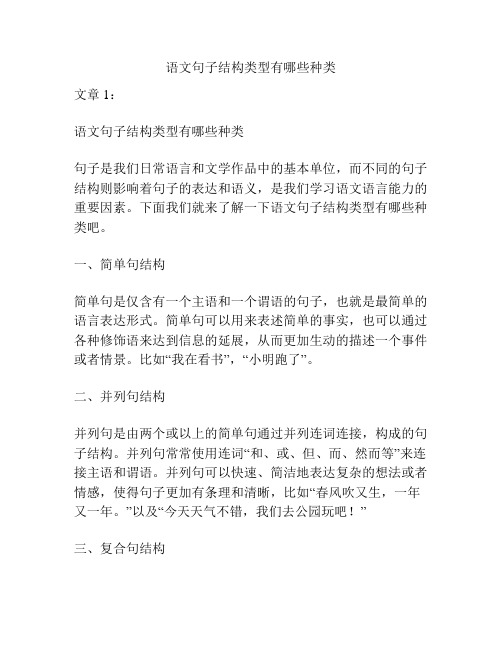
语文句子结构类型有哪些种类文章1:语文句子结构类型有哪些种类句子是我们日常语言和文学作品中的基本单位,而不同的句子结构则影响着句子的表达和语义,是我们学习语文语言能力的重要因素。
下面我们就来了解一下语文句子结构类型有哪些种类吧。
一、简单句结构简单句是仅含有一个主语和一个谓语的句子,也就是最简单的语言表达形式。
简单句可以用来表述简单的事实,也可以通过各种修饰语来达到信息的延展,从而更加生动的描述一个事件或者情景。
比如“我在看书”,“小明跑了”。
二、并列句结构并列句是由两个或以上的简单句通过并列连词连接,构成的句子结构。
并列句常常使用连词“和、或、但、而、然而等”来连接主语和谓语。
并列句可以快速、简洁地表达复杂的想法或者情感,使得句子更加有条理和清晰,比如“春风吹又生,一年又一年。
”以及“今天天气不错,我们去公园玩吧!”三、复合句结构复合句是句子中含有两个及以上的分句,由一个从句和一个主句构成。
主句为这个句型的骨架,而从句则为这个基础提供了更多的信息和意味。
复合句可以通过连词如“因为、所以、尽管、虽然、只要等”连接主句和从句,构成有具体含义的复杂语句,使得句子更加生动、精准和丰富。
比如“我明天去看电影,因为我今天的工作已经完成。
”综上所述,我们可以看出,语文句子结构对于语言表达的精确度和生动性有着至关重要的作用。
不同类型的句子结构在表达信息和目的上各有优劣,需要我们根据实际情况加以选择和运用。
知识点分析:1、简单句、并列句和复合句分别是什么?2、简单句中的主语和谓语作用是什么?3、并列句和复合句的优势和限制分别是什么?此篇文章进行了示范性的介绍语文句子结构的文章,首先概括了3个常见的句子结构,然后简单说明了其用途和优劣,并提供了一些例子加深读者的理解。
文章简洁明了,符合读者的阅读习惯和语文学习的核心要义,对于语文学习有很好的帮助和指导作用。
文章2:语文句子结构类型有哪些种类语文句子结构是指句子按照内在逻辑关系以及句子成分之间的语法关系,分化出不同的表达形式。
句子成分、简单句、并列句与复合句

一、句子成分 (一)句子成分的定义:构成句子的各 个部分叫做句子成分。句子成分有主要 成分和次要成分。 主要成分:主语和谓语。 次要成分:表语、宾语、定语、状语、 宾语补足语、+ 谓语 (S + vi.) An accident happened yesterday. S vi. 2、主语 + 系动词 + 表语 (S + V + P) 3、主语 + 谓语 + 单宾语 (S + vt. + O) 4、主语 + 谓语 + 间宾 + 直宾 (S + vt. + O + O) 5、主语 + 谓语 + 宾语 + 宾补 (S + vt. + O + OC)
3、 并列句的分类 1、表示连接两个同等概念,常用and, not only…but also…, neither… nor…, then等连接。 e.g. The teacher’s name is Smith, and the student’s name is John. 2、表示选择,常用的连词有or, either…or…, otherwise等。 e.g. Hurry up, or you’ll miss the train.
(2)主系表型(S+V+P) 句中的谓语由连系动词加上表语构成。此类简单 句主要反映事物的性质、特征或状态。
注意 系动词有三类,具体如下:
① 表状态: be, seem, appear( 显得 ) , go( 变成 ), stand(坐落),stay(保持), lie(位于), keep(保持) ②表感官: look(看上去), sound(听起来), smell(闻 起来), feel(感觉), taste(尝起来) ③表变化:get(变得),become(成为), turn(变成), grow(渐渐变成),come(成为)
英语基本句子结构
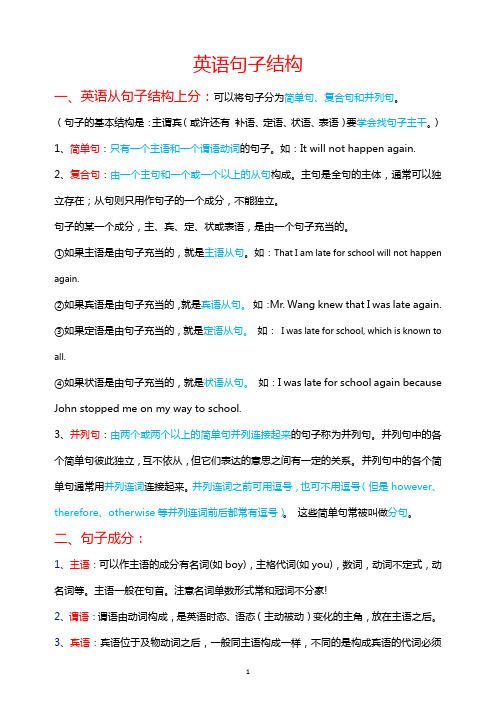
英语句子结构一、英语从句子结构上分:可以将句子分为简单句、复合句和并列句。
(句子的基本结构是:主谓宾(或许还有补语、定语、状语、表语)要学会找句子主干。
)1、简单句:只有一个主语和一个谓语动词的句子。
如:It will not happen again.2、复合句:由一个主句和一个或一个以上的从句构成。
主句是全句的主体,通常可以独立存在;从句则只用作句子的一个成分,不能独立。
句子的某一个成分,主、宾、定、状或表语,是由一个句子充当的。
①如果主语是由句子充当的,就是主语从句。
如:That I am late for school will not happen again.②如果宾语是由句子充当的,就是宾语从句。
如:Mr. Wang knew that I was late again.③如果定语是由句子充当的,就是定语从句。
如:I was late for school, which is known to all.④如果状语是由句子充当的,就是状语从句。
如:I was late for school again because John stopped me on my way to school.3、并列句:由两个或两个以上的简单句并列连接起来的句子称为并列句。
并列句中的各个简单句彼此独立,互不依从,但它们表达的意思之间有一定的关系。
并列句中的各个简单句通常用并列连词连接起来。
并列连词之前可用逗号,也可不用逗号(但是however、therefore、otherwise等并列连词前后都常有逗号)。
这些简单句常被叫做分句。
二、句子成分:1、主语:可以作主语的成分有名词(如boy),主格代词(如you),数词,动词不定式,动名词等。
主语一般在句首。
注意名词单数形式常和冠词不分家!2、谓语:谓语由动词构成,是英语时态、语态(主动被动)变化的主角,放在主语之后。
3、宾语:宾语位于及物动词之后,一般同主语构成一样,不同的是构成宾语的代词必须是‘代词宾格’,如:me,him,them等。
句子是什么结构类型

句子是什么结构类型文章一:句子结构类型简介句子是由词语构成的,用来表达完整思想的语言单位。
根据句子中所包含的成分和成分之间的关系,我们可以将句子分为简单句、并列句和复合句三种结构类型。
一、简单句简单句是由一个主谓结构构成的句子。
主谓结构是指句子中只包含一个主语和一个谓语的语法形式。
一个简单句可以用来表达一个完整的含义,也可以用来作为其他复杂句子的构成部分。
二、并列句并列句是由两个或更多对等的成分组成的句子。
这些成分可以是主语、谓语、宾语、状语等。
并列句的构成方式是采用连接词来连接两个或多个句子,使它们之间达到一定的逻辑和语义关系。
多数连接词有and、or、but等。
三、复合句复合句是由两个或更多句子联合构成的句子。
由于复合句是由两个或更多句子组成的,因此它必须包含从属连词或关系词等连接符号。
从属连词包括了因为、虽然、当然等;关系词有that、who、whose等。
复合句可以分为主从复合句和并列复合句两种类型。
文章二:句子结构分类分析各种不同结构的句子对于英语写作和口语表达都有着重要的意义。
通过划分句子结构,我们可以更好地了解怎样用恰当的结构表达意思。
下面来看看句子结构分类中的三个知识点。
一、分正和倒装结构正结构是指主语在谓语前,而倒装结构则是指动词在主语前。
英语倒装结构的主要形式有全部倒装和部分倒装。
全部倒装通常使用在疑问句中,而部分倒装则较少使用。
例如:正结构:We can make a cake.(我们可以做一个蛋糕。
)全部倒装:Can we make a cake?(我们可以做一个蛋糕吗?)部分倒装:Only then did we realize our mistake.(只有那时我们才意识到我们的错误。
)通过正倒两种结构对比,语句的表达方式就会发生变化。
二、区分主语和宾语的位置主语是句子中最重要的成分,它通常出现在谓语前。
但是,在某些情况下,主语可以放在句子的其他位置,这通常发生在强调某个句子成分时:强调主语:It was the teacher who taught us the lesson.(是老师教给了我们这个课程。
简单句、并列句和复合句的区别
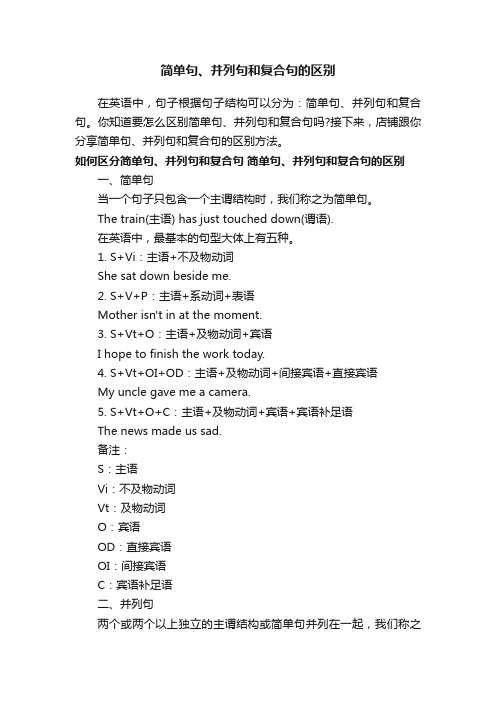
简单句、并列句和复合句的区别在英语中,句子根据句子结构可以分为:简单句、并列句和复合句。
你知道要怎么区别简单句、并列句和复合句吗?接下来,店铺跟你分享简单句、并列句和复合句的区别方法。
如何区分简单句、并列句和复合句简单句、并列句和复合句的区别一、简单句当一个句子只包含一个主谓结构时,我们称之为简单句。
The train(主语) has just touched down(谓语).在英语中,最基本的句型大体上有五种。
1. S+Vi:主语+不及物动词She sat down beside me.2. S+V+P:主语+系动词+表语Mother isn't in at the moment.3. S+Vt+O:主语+及物动词+宾语I hope to finish the work today.4. S+Vt+OI+OD:主语+及物动词+间接宾语+直接宾语My uncle gave me a camera.5. S+Vt+O+C:主语+及物动词+宾语+宾语补足语The news made us sad.备注:S:主语Vi:不及物动词Vt:及物动词O:宾语OD:直接宾语OI:间接宾语C:宾语补足语二、并列句两个或两个以上独立的主谓结构或简单句并列在一起,我们称之为并列句。
各个简单句间是平行并列的关系,而非从属关系。
并列句的各个分句间可用逗号、分号、起连接作用的副词或并列连接词来连接。
1. 能连接并列句的连词and(和,又),but(但是),for(因为),however(然而),or(或者),so(所以,因而),while(然而),yet(然而)2. 能连接并列句的复合连词or else(否则,要不然),either...or...(要么···,要么···;或者···,或者···),neither...nor...(既不···,也不···),not only...but also(不仅···,而且···)3. 能连接并列句的副词besides(而且,还有),hence(因此),otherwise(否则,要不然),then(然后,于是),therefore(因此,所以),thus(因而,从而) 根据并列分句之间的不同关系,并列句则可以分为以下四种。
句子成分与句子结构的辨析
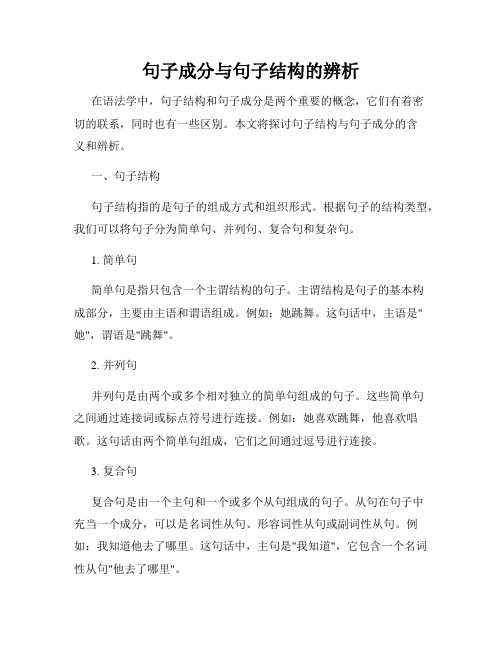
句子成分与句子结构的辨析在语法学中,句子结构和句子成分是两个重要的概念,它们有着密切的联系,同时也有一些区别。
本文将探讨句子结构与句子成分的含义和辨析。
一、句子结构句子结构指的是句子的组成方式和组织形式。
根据句子的结构类型,我们可以将句子分为简单句、并列句、复合句和复杂句。
1. 简单句简单句是指只包含一个主谓结构的句子。
主谓结构是句子的基本构成部分,主要由主语和谓语组成。
例如:她跳舞。
这句话中,主语是"她",谓语是"跳舞"。
2. 并列句并列句是由两个或多个相对独立的简单句组成的句子。
这些简单句之间通过连接词或标点符号进行连接。
例如:她喜欢跳舞,他喜欢唱歌。
这句话由两个简单句组成,它们之间通过逗号进行连接。
3. 复合句复合句是由一个主句和一个或多个从句组成的句子。
从句在句子中充当一个成分,可以是名词性从句、形容词性从句或副词性从句。
例如:我知道他去了哪里。
这句话中,主句是"我知道",它包含一个名词性从句"他去了哪里"。
4. 复杂句复杂句是由一个主句和一个或多个从句组成的句子。
从句在句子中充当一个成分,可以是名词性从句、形容词性从句或副词性从句。
不同于复合句的是,复杂句的从句与主句之间存在一种因果、条件、让步、时间等关系。
例如:如果明天下雨,我们就不去露营。
这句话中,主句是"我们就不去露营",它包含一个条件从句"如果明天下雨"。
二、句子成分句子成分是构成句子的基本要素,是句子中的各个部分。
根据其在句子中的语法功能,句子成分可以分为主语、谓语、宾语、定语、状语和补语等。
1. 主语主语是句子中能回答“谁?做什么?”的成分,通常是句子中的主要主体或动作的执行者。
例如:小明画了一幅漂亮的画。
这句话中,主语是"小明"。
2. 谓语谓语是句子中能回答“做了什么?”的成分,通常是句子中的动作或状态的核心部分。
句子成分、简单句、并列句与复合句(1)概要(20200919165248)
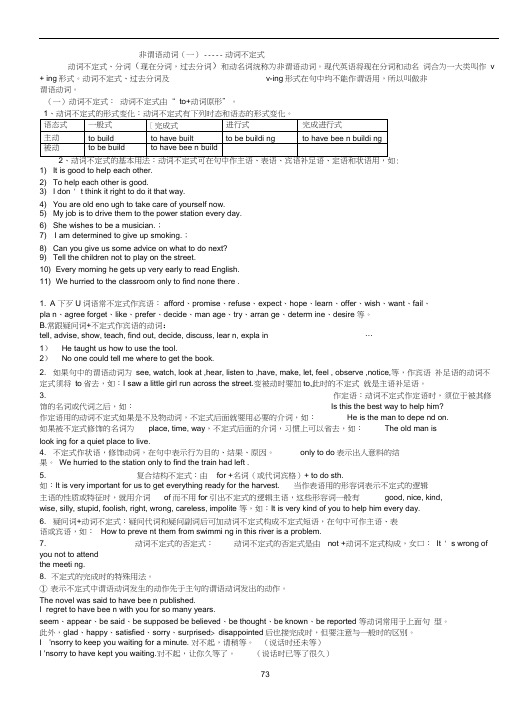
非谓语动词(一)----- 动词不定式动词不定式、分词(现在分词,过去分词)和动名词统称为非谓语动词。
现代英语将现在分词和动名词合为一大类叫作v + ing形式。
动词不定式、过去分词及v-ing形式在句中均不能作谓语用,所以叫做非谓语动词。
(一)动词不定式:动词不定式由“ to+动词原形”。
:1) It is good to help each other.2) To help each other is good.3) I don ' t think it right to do it that way.4) You are old eno ugh to take care of yourself now.5) My job is to drive them to the power station every day.6) She wishes to be a musician.;7) I am determined to give up smoking.;8) Can you give us some advice on what to do next?9) Tell the children not to play on the street.10) Every morning he gets up very early to read English.11) We hurried to the classroom only to find none there .1. A 下歹U词语常不定式作宾语:afford、promise、refuse、expect、hope、learn、offer、wish、want、fail、pla n、agree forget、like、prefer、decide、man age、try、arran ge、determ ine、desire 等。
B.常跟疑问词+不定式作宾语的动词:tell, advise, show, teach, find out, decide, discuss, lear n, expla in …1)He taught us how to use the tool.2)No one could tell me where to get the book.2. 如果句中的谓语动词为see, watch, look at ,hear, listen to ,have, make, let, feel , observe ,notice,等,作宾语补足语的动词不定式须将to省去,如:I saw a little girl run across the street.变被动时要加to,此时的不定式就是主语补足语。
高中英语语法练习一:句子成分;简单句、并列句和复合句

一:句子成分;简单句、并列句和复合句练习一一、指出下列句子划线部分是什么句子成分:1. The students got on the school bus.2. He handed me the newspaper.3. I shall answer your question after class.4. What a beautiful Chinese painting!5. They went hunting together early in the morning.6. His job is to train swimmers.7. He took many photos of the palaces in Beijing.8. There is going to be an American film tonight.9. He is to leave for Shanghai tomorrow.10. His wish is to become a scientist.11. He managed to finish the work in time.12. Tom came to ask me for advice.13. He found it important to master English.14. Do you have anything else to say?15. To be honest; your pronunciation is not so good.16. Would you please tell me your address?17. He sat there, reading a newspaper.18. It is our duty to keep our classroom clean and tidy.19. He noticed a man enter the room.20. The apples tasted sweet.二、用符号划出下列短文各句中的主语(—)、谓语(=)、宾语(~):I hope you are very well. I'm fine, but tired. Right now it is the summer vacation and I'm helping my Dad on the farm. August is the hottest month here. It is the time of year for the rice harvest, so every day I work from dawn until dark. Sometimes we go on working after dark by the lights of our tractors. We grow rice in the south of the States, but in the north where it is colder they grow wheat. We have a lot of machines on the farm. Although the farm is large, my Dad hasonly two men working for him. But he employs more men for the harvest. My brother takes care of the vegetable garden. It doesn't often rain in the summer here. As a result, we have to water the vegetable garden. Every evening we pump water from a well. It then runs along channels to different parts of the garden.三、用符号划出下列短文各句中的定语(—)、状语(=)、补语(~):Most Saturday evenings there is a party, even at harvest time. These parties often make us very happy. We cook meat on an open fire outside. It's great! Americans eat a lot of meat — too much in my opinion. Some of my friends drink beer. I don't, because I have to drive home after the party. In your letter you asked about the time in different areas of the States. There are five different time areas in the States. In my state we are fourteen hours behind Beijing time. How many different time areas do you have in China? Well, I must stop and get some sleep. Please give my best regards to your parents.四、选择填空:( )1. ____ will leave for Beijing.A. Now there the manB. The man here nowC. The man who is here nowD. The man is here now( ) 2. The weather ____.A. wet and coldB. is wet and coldC. not wet and coldD. were wet and cold ( ) 3. The apple tasted ____.A. sweetsB. sweetlyC. nicelyD. sweet( ) 4. He got up ____ yesterday morning.A. latelyB. lateC. latestD. latter( )5. The actor ______at the age of 70.A. deadB. diedC. dyedD. deaded( )6. ____ were all very tired, but none of ____ would stop to take a rest.A. We, usB. Us, weC. We, ourD. We, we( )7. He found the street much ______.A. crowdB. crowdingC. crowdedD. crowdedly( ) 8.I think _____necessary to learn English well.A. itsB. itC. thatD. that is( ) 9. The dog ____ mad.A. looksB. is lookedC. is being lookedD. was looked( )10.I will never forget the day ______ I joined the army.A. thatB. whenC. in whichD. where练习二一、判断下列句子是简单句、并列句还是复合句:1. We often study Chinese history on Friday afternoon.2. The boy who offered me his seat is called Tom.3. There is a chair in this room, isn’t there?4. My brother and I go to school at half past seven in the morning and come back home at seven in the evening.5. He is in Class One and I am in Class Two.6. He was fond of drawing when he was yet a child.7. Neither has he changed his mind, nor will he do so.8. What he said at the meeting is very important, isn’t it?9. The farmer is showing the boy how to plant a tree.10. Both Tom and Jack enjoy country music.二、判断下列短文中各句是简单句、并列句还是复合句:I hope you are very well(). I'm fine, but tired(). Right now it is the summer vacation and I'm helping my Dad on the farm(). August is the hottest month here(). It is the time of year for the rice harvest, so every day I work from dawn until dark.()Sometimes we go on working after dark by the lights of our tractors(). We grow rice in the south of the States, but in the north where it is colder they grow wheat(). We have a lot of machines on the farm(). Although the farm is large, my Dad has only two men working for him(). But he employs more men for the harvest(). My brother takes care of the vegetable garden(). It doesn't often rain in the summer here (). As a result, we have to water the vegetable garden(). Every evening we pump water from a well(). It then runs along channels to different parts of the garden().Most Saturday evenings there is a party, even at harvest time(). These parties often make us very happy(). We cook meat on an open fire outside(). It's great()! Americans eat a lot of meat — too much in my opinion(). Some of my friends drink beer(). I don't, because I have to drive home after the party(). In your letter you asked about the time in different areas of the States(). There are five different time areas in the States(). In my state we are fourteen hours behind Beijing time(). How many different time areas do you have in China()? Well, I must stop and get some sleep(). Please give my best regards to your parents().三、选择填空:1. Give me one more minute ____ I’ll be able to finish it.A. andB. orC. ifD. so2. It’s the third time that John has been late, ____?A. hasn’t heB. isn’t heC. isn’t itD. hasn’t it3. ____ joyful he was to meet his brother again!A. HowB. WhatC. What aD. What an4. Let us pass, ____?A. shan’t weB. shall weC. won’t weD. will you5. I suppose he’s serious, ____ ?A. do IB. don’t IC. is heD. isn’t he6. You had better not smoke here, ____?A. will youB. had youC. shall youD. have you7. Train as hard as you can ____ you’ll win the swimming competition.A. thenB. butC. andD. or8. I’m sorry to have to say this, ____ you forgot to turn off the lights when you left the room last night.A. andB. butC. soD. because9. John has not yet passed the driving test, and ____.A. Henry hasn’t tooB. Henry also has not eitherC. neither Henry hasD. neither has Henry10. There are many sports lovers in his office. Some love climbing, ____ others enjoy swimming.A. orB. forC. whileD. so11. ---- Do you feel like going out ____ would you rather have dinner at home?---- I’d like to go out. A. or B. and C. but D. so12. ---- “____ is the temperature today?”----“It’s 38 degrees.”A. WhichB. HowC. How hotD. How high13. ---- Your uncle isn’t an engineer, is he?---- ____.A. Yes, he isn’tB. No, he isn’tC. No, he isD. He is14. ____ friendly ____ to everyone!A. How, is sheB. What, is sheC. How, she isD. What, she is15. Mary went to bed early, ____ she felt very tired.A. orB. soC. forD. yet16. Mother ____ a dress when she cut her finger.A. was makingB. makesC. is makingD. made17. He lay in bed ____ read something borrowed from library.A. butB. andC. orD. yet18. ---- I’d really like some lunch but I have so much work to do.---- ____ what you want and I can get it for you.A. Tell meB. If you would say to meC. You will tell meD. If you tell me19. As he is strong, ____ can lift one hundred pounds.A. yet heB. but heC. andD. he20. ---- I thought you had an umbrella. ---- I had, ____ I’ve lost it.A. sinceB. butC. becauseD. so21. ____ down the radio ---- the baby’s asleep in the next room.A. TurningB. To turnC. TurnedD. Turn22. ---- I don’t like chicken ____ fish.---- I don’t like chicken ____ I like fish very much.A. and, andB. and, butC. or, andD. or, but23. ---- Would you like to come to dinner tonight? ---- I’d like to, ____ I’m too busy.A. andB. soC. asD. but24. Would you like a cup of coffee ____ shall we get down to business right away?A. andB. thenC. orD. otherwise25. She set out soon after dark ____ home an hour later.A. arrivingB. to arriveC. having arrivedD. and arrived26. “Can’t you read?” Mary said ____ to the notice.A. angrily pointingB. and point angrilyC. angrily pointedD. and angrily pointed27. She thought I was talking about her daughter, ____, in fact, I was talking about my daughter.A. whomB. whereC. whichD. while28. ____ it with me and I’ll see what I can do.A. When leftB. LeavingC. If you leaveD. Leave29. ---- Alice, you feed the bird today, ____? ---- But I fed it yesterday.A. do youB. will youC. didn’t youD. don’t you30. ____ him and then try to copy what he does.A. MindB. Glance atC. Stare atD. Watch四、按要求完成下列句子:1. He dares to tell the truth.(改为否定句)2. They have lived here for more than ten years.(对画线部分提问)3. There will be a sports meet at the end of this month, ____________?(完成反意疑问)4. You must be careful with your pronunciation.(改为祈使句)5. They went for a walk after supper yesterday evening.(改为一般疑问句)6. It is an interesting story.(改为感叹句)7. This magazine comes out(出版)every other week.(对画线部分提问)8. They could hardly believe his words, ____________?(完成反意疑问)9. The moon is shining brightly.(改为感叹句)10.Our English teacher is always encouraging us to speak English in class. (对画线部分提问)答案:练习一:一、1、主语,定语;2、间接宾语;3、谓语,状语;4、定语;5、状语,状语;6、定语,表语;7、宾语,状语;8、谓语,主语;9、谓语;10、主语,表语;11、谓语,宾语;12、状语;13、形式宾语,真正宾语;14、宾语、定语;15、插入语,状语;16、宾语(间宾+直宾);17、状语,状语;18、形式主语,表语,宾补;19、宾补;20、表语二、略三、略四、1~5 CBDBB 6~10 ACBAB练习二:一、1、简单句;2、复合句;3、简单句;4、简单句;5、并列句;6、复合句;7、并列句;8、复合句;9、简单句;10、简单句二、I hope you are very well(复合句). I'm fine, but tired(简单句). Right now it is the summer vacation and I'm helping my Dad on the farm(并列句). August is the hottest month here(简单句). It is the time of year for the rice harvest, so every day I work from dawn until dark.(并列句)Sometimes we go on working after dark by the lights of our tractors(简单句). We grow rice in the south of the States, but in the north where it is colder they grow wheat(并列复合句). We have a lot of machines on the farm(简单句). Although the farm is large, my Dad has only two men working for him(复合句). But he employs more men for the harvest(简单句). My brother takes care of the vegetable garden(简单句). It doesn't often rain in the summer here(简单句). As a result, we have to water the vegetable garden(简单句). Every evening we pump water from a well(简单句). It then runs along channels to different parts of the garden(简单句).Most Saturday evenings there is a party, even at harvest time(简单句). These parties often make us very happy(简单句). We cook meat on an open fire outside(简单句). It's great(简单句)! Americans eat a lot of meat — too much in my opinion(简单句). Some of my friends drink beer(简单句). I don't, because I have to drive home after the party(复合句). In your letter you asked about the time in different areas of the States(简单句). There are five different time areas in the States(简单句). In my state we are fourteen hours behind Beijing time (简单句). How many different time areas do you have in China(简单句)? Well, I must stop and get some sleep(简单句). Please give my best regards to your parents(简单句).三、1~5 ACADD 6~10 BCBDC 11~15 ADBCC 16~20 ABADB 21~25 DDDCD 26~30 ADDBD四、1. He doesn’t dare to tell the truth. 或He dare not tell the truth. 2. How long have they lived here? 3. won’t there 4. Be careful with your pronunciation. 5. Did they go for a walk after supper yesterday evening? 6. What an interesting story (it is)! 或How interesting the story is!7. How often does this magazine come out? 8. could they 9. How brightly the moon is shining!10. Who is always encouraging us to speak English in class?。
英语句子成分和简单句五种基本句型
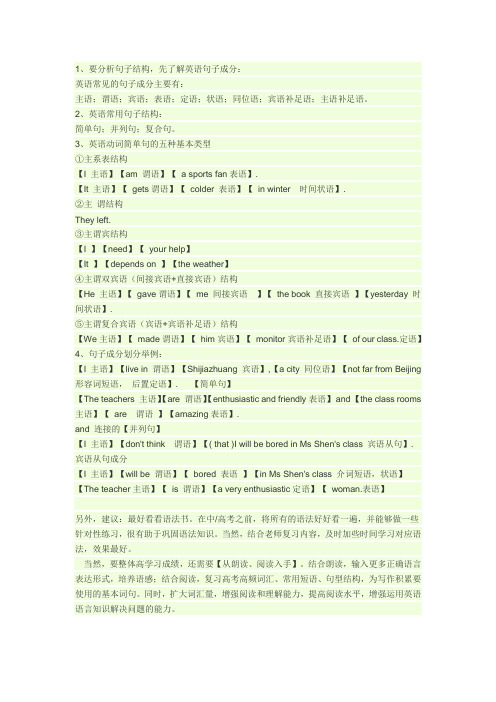
1、要分析句子结构,先了解英语句子成分:英语常见的句子成分主要有:主语;谓语;宾语;表语;定语;状语;同位语;宾语补足语;主语补足语。
2、英语常用句子结构:简单句;并列句;复合句。
3、英语动词简单句的五种基本类型①主系表结构【I 主语】【am 谓语】【a sports fan表语】.【It 主语】【gets谓语】【colder 表语】【in winter 时间状语】.②主谓结构They left.③主谓宾结构【I 】【need】【your help】【It 】【depends on 】【the weather】④主谓双宾语(间接宾语+直接宾语)结构【He 主语】【gave谓语】【me 间接宾语】【the book 直接宾语】【yesterday 时间状语】.⑤主谓复合宾语(宾语+宾语补足语)结构【We主语】【made谓语】【him宾语】【monitor宾语补足语】【of our class.定语】4、句子成分划分举例:【I 主语】【live in 谓语】【Shijiazhuang 宾语】,【a city 同位语】【not far from Beijing 形容词短语,后置定语】. 【简单句】【The teachers 主语】【are 谓语】【enthusiastic and friendly表语】and 【the class rooms 主语】【are 谓语】【amazing表语】.and 连接的【并列句】【I 主语】【don't think 谓语】【( that )I will be bored in Ms Shen's class 宾语从句】. 宾语从句成分【I 主语】【will be 谓语】【bored 表语】【in Ms Shen's class 介词短语,状语】【The teacher主语】【is 谓语】【a very enthusiastic定语】【woman.表语】另外,建议:最好看看语法书。
英语简单句、并列句、复合句
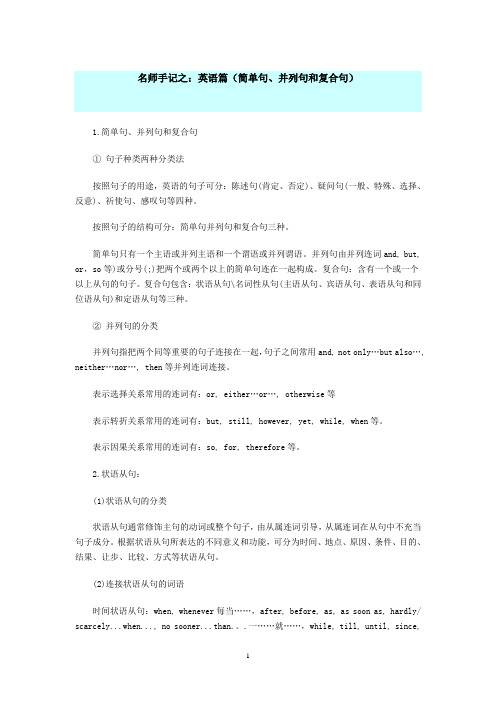
名师手记之:英语篇(简单句、并列句和复合句)1.简单句、并列句和复合句① 句子种类两种分类法按照句子的用途,英语的句子可分:陈述句(肯定、否定)、疑问句(一般、特殊、选择、反意)、祈使句、感叹句等四种。
按照句子的结构可分:简单句并列句和复合句三种。
简单句只有一个主语或并列主语和一个谓语或并列谓语。
并列句由并列连词and, but, or,so等)或分号(;)把两个或两个以上的简单句连在一起构成。
复合句:含有一个或一个以上从句的句子。
复合句包含:状语从句\名词性从句(主语从句、宾语从句、表语从句和同位语从句)和定语从句等三种。
② 并列句的分类并列句指把两个同等重要的句子连接在一起,句子之间常用and, not only…but also…, neither…nor…, then等并列连词连接。
表示选择关系常用的连词有:or, either…or…, otherwise等表示转折关系常用的连词有:but, still, however, yet, while, when等。
表示因果关系常用的连词有:so, for, therefore等。
2.状语从句:(1)状语从句的分类状语从句通常修饰主句的动词或整个句子,由从属连词引导,从属连词在从句中不充当句子成分。
根据状语从句所表达的不同意义和功能,可分为时间、地点、原因、条件、目的、结果、让步、比较、方式等状语从句。
(2)连接状语从句的词语时间状语从句:when, whenever每当……,after, before, as, as soon as, hardly/ scarcely...when..., no sooner...than.。
.一……就……,while, till, until, since,once。
名词词组the first time第一次,last time最后一次,every/each time每次,the next time下次,the next day第二天, the moment, the minute, the second, the instant 一……就……;副词immediately, instantly, directly等也可作连词使用。
句子成分

2、并列句
• 并列句就是两个或以上的简单句,由表示 并列关系的连词连接而成。常用的连词有 and, but, or, not only...but also等。 • 阅读中,遇到并列关系的句子,一般情况 下是以连词为界限,将句子分成前、后几 个部分,一个部分一个部分的看,各句的 意思一般可以单独理解,最后将各句合并 即可。
二、谓语
谓语说明主语所做的动作或具有的特征和状态 • 用来回答、说明、解释主语“做什么”、“怎么 样”等等的部分就是“谓语”。 • 英语句子中,除少数情况外,谓语必须是动词。 而且,除了倒装等特殊情况外,谓语的位置相对 来说是固定的,它总是位于主语的后面。 即句 子最主要的两大成份位置是:主语->谓语。 •
• There are five different time areas in the States (). In my state we are fourteen hours behind Beijing time(). How many different time areas do you have in China()? Well, I must stop and get some sleep( ). Please give my best regards to your parents().
• Most Saturday evenings there is a party, even at harvest time( ). These parties often make us very happy( ). We cook meat on an open fire outside(). It's great()! Americans eat a lot of meat — too much in my opinion(). Some of my friends drink beer(). I don't, because I have to drive home after the party (). In your letter you asked about the time in different areas of the States( ).
句子成分及简单句-并列句-复合句

学习必备欢迎下载简单句(Simple sentence)及句子成分(Members of the sentence)(一)简单句一、定义:由一个主语部分和一个谓语部分组成。
eg. He [often] goes [to school][by bike]. He gave me a dictionary [yesterday].He has finished the work [already]. He [always] makes me <happy>.He is doing (his) homework. He did a (good) job. He is a student.注:表主语, 表谓语, 表宾语, ( )表定语, [ ]表状语, < >表补语, 表表语。
二、简单句的五种基本句型:1. 主语+谓语(不及物动词) [S + Vi]eg. The children are playing [happily]. 孩子们正在高兴地玩。
(Such) things [often] happen. 这种事情经常发生。
(The new) term begins [in September]. 新学年从九月份开始。
注:不及物动词后不带宾语,若其后需带宾语,须搭配一介词to/at/on/for等。
eg. He arrived in Beijing [yesterday]. He was listening to the music.2. 主语+谓语(及物动词)+宾语[S+Vt+O]eg. The Greens enjoy living in China. 格林一家喜欢住在中国。
I missed the train. 我错过了火车。
注:及物动词其后一般必须带宾语。
常用跟单宾语的动词有:enjoy, forget, remember, guess, love, hate, supply, use 等3. 主语+谓语+表语[S+V+P]该句型谓语动词为连系动词。
句子结构:简单句、复合句、并列句的划分与运用

叙述事件:叙述一件事 情的发生过程
描述关系:描述事物之 间的关系或联系
复合句的划分与运
02
用
复合句的定义
复合句是由两个或 两个以上的简单句 组成的句子
复合句中的简单句 之间存在一定的逻 辑关系
复合句可以分为并 列复合句、转折复 合句、因果复合句 等类型
复合句的划分与运 用需要掌握句子成 分、句型结构等基 础知识
并列句的构成要素
并列句由两个 或两个以上的
分句组成
每个分句的语 法结构相同,
词性相同
每个分句表达 的意思相关, 可以独立成句
并列句的连接 词包括“和”、
“或”、 “既……又……”
等
并列句的类型
简单并列句:由两个或两个以上的简单句组成,每个简单句都表达一个完整的意思。
复杂并列句:由两个或两个以上的复杂句组成,每个复杂句都表达一个完整的意思。
简单句的构成要素
主语:句子的主要行 动者或接受者
谓语:表示主语的行 为或状态
宾语:表示动作的承 受者或结果
定语:修饰名词或代 词,表示其特征或属
性
状语:修饰动词、形 容词、副词,表示时 间、地点、方式等
补语:补充说明谓语 的结果或程度
同位语:对名词或代 词进行解释说明或补
充说明
插入语:对句子进行 补充说明或解释,不
同位语:对主语或宾语
进行补充说明
连词:连接句子成分, 表示逻辑关系
复合句的类型
名词性从句: 包括主语从句、 宾语从句、表
语从句等
定语从句:包 括限制性定语 从句和非限制
性定语从句
状语从句:包 括时间状语从 句、地点状语 从句、原因状
语从句等
同位语从句: 用于解释或说 明前面的名词
句子类型怎么判断
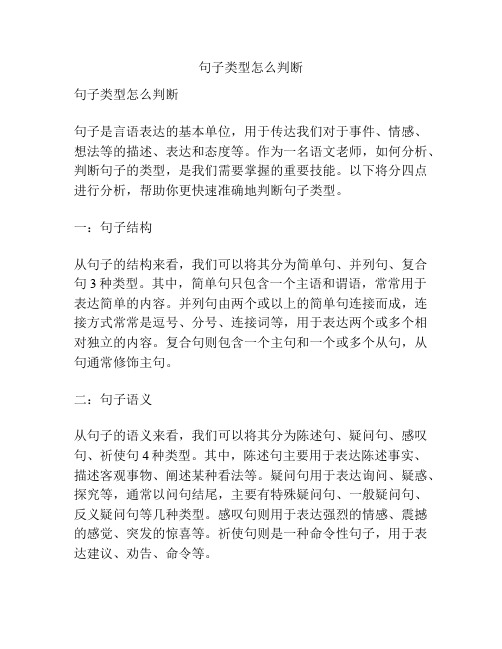
句子类型怎么判断句子类型怎么判断句子是言语表达的基本单位,用于传达我们对于事件、情感、想法等的描述、表达和态度等。
作为一名语文老师,如何分析、判断句子的类型,是我们需要掌握的重要技能。
以下将分四点进行分析,帮助你更快速准确地判断句子类型。
一:句子结构从句子的结构来看,我们可以将其分为简单句、并列句、复合句3种类型。
其中,简单句只包含一个主语和谓语,常常用于表达简单的内容。
并列句由两个或以上的简单句连接而成,连接方式常常是逗号、分号、连接词等,用于表达两个或多个相对独立的内容。
复合句则包含一个主句和一个或多个从句,从句通常修饰主句。
二:句子语义从句子的语义来看,我们可以将其分为陈述句、疑问句、感叹句、祈使句4种类型。
其中,陈述句主要用于表达陈述事实、描述客观事物、阐述某种看法等。
疑问句用于表达询问、疑惑、探究等,通常以问句结尾,主要有特殊疑问句、一般疑问句、反义疑问句等几种类型。
感叹句则用于表达强烈的情感、震撼的感觉、突发的惊喜等。
祈使句则是一种命令性句子,用于表达建议、劝告、命令等。
三:句子语气从句子的语气来看,我们可以将其分为陈述语气、疑问语气、感叹语气、祈使语气4种类型。
其中,陈述语气表示说话人对所述内容的真实性、客观性的信任或肯定。
疑问语气则表达对所述内容的询问、疑虑或不确定。
感叹语气则表达强烈的情感、感觉或评价。
祈使语气则表达命令、请求、劝诫等行为。
四:句子成分从句子的成分来看,我们可以将其分为主谓句、主谓宾句、主系表句、动补结构句、状语从句、定语从句等几种类型。
其中,主谓句仅由主谓两部分构成。
主谓宾句中还包含宾语,通常表示动作的对象。
主系表句则由主语、系动词和表语构成,表达的是主语的身份、性质等。
动补结构句由动词和其宾语所构成的补语组成,用于表示主语的状态或特点。
状语从句则由一个句子作为修饰语修饰主句中的谓语。
定语从句则由一个句子充当名词的定语。
总之,判断句子类型需要综合考虑其结构、语义、语气和成分等各方面的因素,才能得到正确的答案。
简单句,并列句,复合句
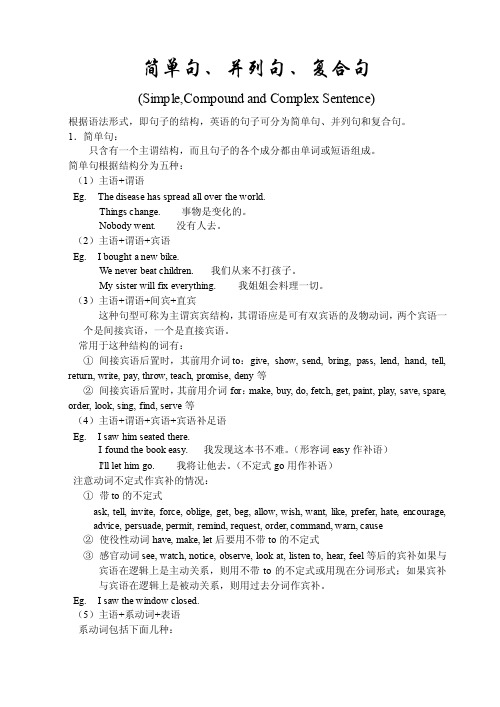
简单句、并列句、复合句(Simple,Compound and Complex Sentence)根据语法形式,即句子的结构,英语的句子可分为简单句、并列句和复合句。
1.简单句:只含有一个主谓结构,而且句子的各个成分都由单词或短语组成。
简单句根据结构分为五种:(1)主语+谓语Eg. The disease has spread all over the world.Things change. 事物是变化的。
Nobody went. 没有人去。
(2)主语+谓语+宾语Eg. I bought a new bike.We never beat children. 我们从来不打孩子。
My sister will fix everything. 我姐姐会料理一切。
(3)主语+谓语+间宾+直宾这种句型可称为主谓宾宾结构,其谓语应是可有双宾语的及物动词,两个宾语一个是间接宾语,一个是直接宾语。
常用于这种结构的词有:①间接宾语后置时,其前用介词to:give, show, send, bring, pass, lend, hand, tell, return, write, pay, throw, teach, promise, deny等②间接宾语后置时,其前用介词for:make, buy, do, fetch, get, paint, play, save, spare, order, look, sing, find, serve等(4)主语+谓语+宾语+宾语补足语Eg. I saw him seated there.I found the book easy. 我发现这本书不难。
(形容词easy作补语)I'll let him go. 我将让他去。
(不定式go用作补语)注意动词不定式作宾补的情况:①带to的不定式ask, tell, invite, force, oblige, get, beg, allow, wish, want, like, prefer, hate, encourage, advice, persuade, permit, remind, request, order, command, warn, cause②使役性动词have, make, let后要用不带to的不定式③感官动词see, watch, notice, observe, look at, listen to, hear, feel等后的宾补如果与宾语在逻辑上是主动关系,则用不带to的不定式或用现在分词形式;如果宾补与宾语在逻辑上是被动关系,则用过去分词作宾补。
高考英语句子成分及句子种类(简单句、并列句和复合句)

四、选择填空:
• ( )1. ____ will leave for Beijing. A. Now there the man B. The man here now C. The man who is here now D. The man is here now • ( ) 2. The weather ____. • A. wet and cold B. is wet and cold • C. not wet and cold D. were wet and cold • ( ) 3. The apple tasted ____. • A. sweets B. sweetly C. nicely D. sweet • ( ) 4. He got up ____ yesterday morning. • A. lately B. late C. latest D. latter • ( )5. The actor ______at the age of 70. • A. dead B. died C. dyed D. deaded • ( )6. ____ were all very tired, but none of ____ would stop to take a rest. • A. We, us B. Us, we C. We, our D. We, we
• 6. I’m sorry to have to say this, ____ you forgot to turn off the lights when you left the room last night. • A. and B. but C. so D. because • 7. John has not yet passed the driving test, and ____. • A. Henry hasn’t too B. Henry also has not either • C. neither Henry has D. neither has Henry • 8. There are many sports lovers in his office. Some love climbing, ____ others enjoy swimming. • A. or B. for • C. while D. so • 9. ---- Do you feel like going out ____ would you rather have dinner at home? • ---- I’d like to go out. • A. or B. and C. but D. so
五种基本句型+划分句子成分

(一),简单句 S+V+O (即主语+谓语+宾语) (二),并列句
S1+V1+O1+but/yet/however/so/therefore/ and+S2+V2+O2 (三),主从并列句 S1+V1+O1+conj(主从复合句的连词) +S2+V2+O2
二,简单句的各种成 分:
4. She doesn’t mind being laughed at.
She is a beautiful girl. I like fishing. It turns out to be good. She sent me a letter. It seems so nice. Your brother has gone home.. The sun rises in the east.
Your brother has gone home. 主语,谓语,状语 The sun rises in the east. 主语,谓语,状语
划分句子成分
1.The girl under the tree is Kate . 2.I bought a new dictionary. 3.The boy is in this room. 4.Your watch is not the same as mine. 5.The poor boy was my son. 6.When he came in, she smiled.
主语+及物动词+宾语+宾语补 足语
They study French. Tom gives me a pen-box. He found the old man
句子成分简单句并列句和复合句.
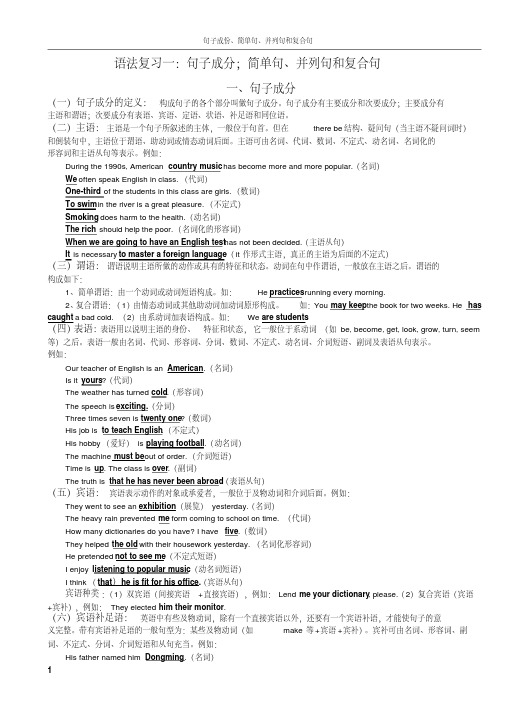
语法复习一:句子成分;简单句、并列句和复合句一、句子成分(一)句子成分的定义:构成句子的各个部分叫做句子成分。
句子成分有主要成分和次要成分;主要成分有主语和谓语;次要成分有表语、宾语、定语、状语、补足语和同位语。
(二)主语:主语是一个句子所叙述的主体,一般位于句首。
但在there be结构、疑问句(当主语不疑问词时)和倒装句中,主语位于谓语、助动词或情态动词后面。
主语可由名词、代词、数词、不定式、动名词、名词化的形容词和主语从句等表示。
例如:During the 1990s, American country music has become more and more popular.(名词)We often speak English in class.(代词)One-third of the students in this class are girls.(数词)To swim in the river is a great pleasure.(不定式)Smoking does harm to the health.(动名词)The rich should help the poor.(名词化的形容词)When we are going to have an English test has not been decided.(主语从句)It is necessary to master a foreign language.(it作形式主语,真正的主语为后面的不定式)(三)谓语:谓语说明主语所做的动作或具有的特征和状态。
动词在句中作谓语,一般放在主语之后。
谓语的构成如下:1、简单谓语:由一个动词或动词短语构成。
如:He practices running every morning.2、复合谓语:(1)由情态动词或其他助动词加动词原形构成。
如:You may keep the book for two weeks. He has caught a bad cold. (2)由系动词加表语构成。
英语句子结构-简单句成分
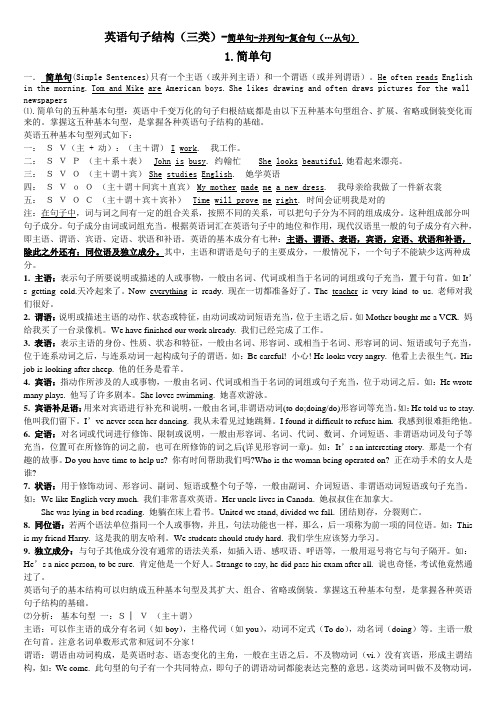
英语句子结构(三类)-简单句-并列句-复合句(…从句)1.简单句一.简单句(Simple Sentences)只有一个主语(或并列主语)和一个谓语(或并列谓语)。
He often reads English in the morning.Tom and Mike are American boys.She likes drawing and often draws pictures for the wall newspapers⑪.简单句的五种基本句型:英语中千变万化的句子归根结底都是由以下五种基本句型组合、扩展、省略或倒装变化而来的。
掌握这五种基本句型,是掌握各种英语句子结构的基础。
英语五种基本句型列式如下:一:SV(主 + 动):(主+谓)-I work. 我工作。
二:SVP(主+系+表)- John is busy. 约翰忙 She looks beautiful.她看起来漂亮。
三:SVO(主+谓+宾)-She studies English. 她学英语四:SVoO(主+谓+间宾+直宾)-My mother made me a new dress. 我母亲给我做了一件新衣裳五:SVOC(主+谓+宾+宾补)- Time will prove me right. 时间会证明我是对的注:在句子中,词与词之间有一定的组合关系,按照不同的关系,可以把句子分为不同的组成成分。
这种组成部分叫句子成分。
句子成分由词或词组充当。
根据英语词汇在英语句子中的地位和作用,现代汉语里一般的句子成分有六种,即主语、谓语、宾语、定语、状语和补语。
英语的基本成分有七种:主语、谓语、表语,宾语,定语、状语和补语,除此之外还有:同位语及独立成分。
其中,主语和谓语是句子的主要成分,一般情况下,一个句子不能缺少这两种成分。
1. 主语:表示句子所要说明或描述的人或事物,一般由名词、代词或相当于名词的词组或句子充当,置于句首。
如It’s getting cold.天冷起来了。
- 1、下载文档前请自行甄别文档内容的完整性,平台不提供额外的编辑、内容补充、找答案等附加服务。
- 2、"仅部分预览"的文档,不可在线预览部分如存在完整性等问题,可反馈申请退款(可完整预览的文档不适用该条件!)。
- 3、如文档侵犯您的权益,请联系客服反馈,我们会尽快为您处理(人工客服工作时间:9:00-18:30)。
句子成分、简单句、并列句和复合句一、句子成分(一)句子成分的定义:构成句子的各个部分叫做句子成分。
句子成分有主要成分和次要成分;主要成分有主语和谓语;次要成分有表语、宾语、定语、状语、补足语和同位语。
(二)主语:主语是一个句子所叙述的主体,一般位于句首。
但在there be结构、疑问句(当主语不疑问词时)和倒装句中,主语位于谓语、助动词或情态动词后面。
主语可由名词、代词、数词、不定式、动名词、名词化的形容词和主语从句等表示。
例如:During the 1990s, Ameri can country music has become more and more popular.(名词)We often speak English in class.(代词)One-third of the students in this class are girls.(数词)To swim in the river is a great pleasure.(不定式)Smoking does harm to the health.(动名词)The rich should help the poor.(名词化的形容词)When we are going to have an English test has not been decided.(主语从句)It is necessary to master a foreign language.(it作形式主语,真正的主语为后面的不定式)(三)谓语:谓语说明主语所做的动作或具有的特征和状态。
动词在句中作谓语,一般放在主语之后。
谓语的构成如下:1、简单谓语:由一个动词或动词短语构成。
如:He practices running every morning.2、复合谓语:(1)由情态动词或其他助动词加动词原形构成。
如:You may keep the book for two weeks. He has caught a bad cold. (2)由系动词加表语构成。
如:We are students.(四)表语:表语用以说明主语的身份、特征和状态,它一般位于系动词(如be, become, get, look, grow, turn, seem 等)之后。
表语一般由名词、代词、形容词、分词、数词、不定式、动名词、介词短语、副词及表语从句表示。
例如:Our teacher of English is an American.(名词)Is it yours?(代词)The weather has turned cold.(形容词)The speech is exciting.(分词)Three times seven is twenty one?(数词)His job is to teach English.(不定式)His hobby(爱好)is playing football.(动名词)The machine must be out of order.(介词短语)Time is up. The class is over.(副词)The truth is that he has never been abroad.(表语从句)(五)宾语:宾语表示动作的对象或承爱者,一般位于及物动词和介词后面。
例如:They went to see an exhibition(展览)yesterday.(名词)The heavy rain prevented me form coming to school on time.(代词)How many dictionaries do you have? I have five.(数词)They helped the old with their housework yesterday.(名词化形容词)He pretended not to see me.(不定式短语)I enjoy listening to popular music.(动名词短语)I think(that)he is fit for his office.(宾语从句)宾语种类:(1)双宾语(间接宾语+直接宾语),例如:Lend me your dictionary, please.(2)复合宾语(宾语+宾补),例如:They elected him their monitor.(六)宾语补足语:英语中有些及物动词,除有一个直接宾语以外,还要有一个宾语补语,才能使句子的意义完整。
带有宾语补足语的一般句型为:某些及物动词(如make等+宾语+宾补)。
宾补可由名词、形容词、副词、不定式、分词、介词短语和从句充当。
例如:His father named him Dongming.(名词)They painted their boat white.(形容词)Let the fresh air in.(副词)You mustn’t force him to lend his money to you.(不定式短语)We saw her entering the room.(现在分词)We found everything in the lab in good order.(介词短语)We will soon make our city what your city is now.(从句)(七)定语:修饰名词或代词的词、短语或从句称为定语。
定语可由以下等成分表示:Guilin is a beautiful city.(形容词)China is a developing country; America is a developed country.(分词)There are thirty women teachers is our school.(名词)His rapid progress in English made us surprised.(代词)Our monitor is always the first to enter the classroom.(不定式短语)The teaching plan for next term has been worked out.(动名词)He is reading an article about how to learn English.(介词短语)(八)状语:修饰动词、形容词、副词或整个句子,说明动作或状态特征的句子成分,叫做状语。
可由以下形式表示:Light travels most quickly.(副词及副词性词组)He has lived in the city for ten years.(介词短语)He is proud to have passed the national college entrance examination.(不定式短语)He is in the room making a model plane.(分词短语)Wait a minute.(名词)Once you begin, you must continue.(状语从句)状语种类如下:How about meeting again at six?(时间状语)Last night she didn’t go to the dance party because of the rain.(原因状语)I shall go there if it doesn’t rain.(条件状语)Mr Smith lives on the third floor.(地点状语)She put the eggs into the basket with great care.(方式状语)She came in with a dictionary in her hand.(伴随状语)In order to catch up with the others, I must work harder.(目的状语)He was so tired that he fell asleep immediately.(结果状语)She works very hard though she is old.(让步状语)I am taller than he is.(比较状语)练习一一、指出下列句子划线部分是什么句子成分:1. The students got on the school bus.2. He handed me the newspaper.3. I shall answer your question after class.4. What a beautiful Chinese painting!5. They went hunting together early in the morning.6. His job is to train swimmers.7. He took many photos of the palaces in Beijing.8. There is going to be an American film tonight.9. He is to leave for Shanghai tomorrow.10. His wish is to become a scientist.11. He managed to finish the work in time.12. Tom came to ask me for advice.13. He found it important to master English.14. Do you have anything else to say?15. To be honest; your pronunciation is not so good.16. Would you please tell me your address?17. He sat there, reading a newspaper.18. It is our duty to keep our classroom clean and tidy.19. He noticed a man enter the room.20. The apples tasted sweet.二、简单句、并列句和复合句(一)句子种类两种分类法1、按句子的用途可分四种:1)陈述句(肯定、否定):He is six years old; She didn’t hear of you before.2)疑问句(一般、特殊、选择、反意):Do they like skating? How old is he? Is he six or seven years old? Mary can swim, can’t she?3)祈使句:Be careful, boys; Don’t talk in class4)感叹句:How clever the boy is!2、按句子的结构可分三种:1)简单句:只有一个主语(或并列主语)和一个谓语(或并列谓语)。
